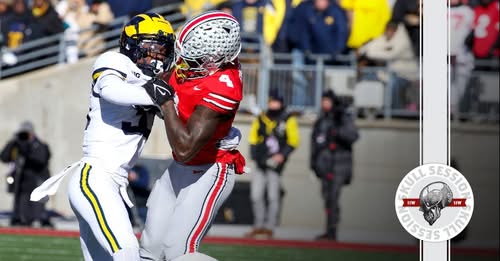According to CBS Sports’ Josh Pate, Ryan Day’s top priority as Ohio State’s head coach isn’t winning a national championship—it’s beating Michigan.
CBS Sports analyst Josh Pate recently reignited a fierce and ongoing debate in college football circles when he stated that for Ohio State head coach Ryan Day, beating Michigan is more important than winning a national championship. At first glance, that statement might seem absurd. After all, college football is built around the pursuit of national titles. But when you dig into the culture, history, and pressure surrounding the Ohio State-Michigan rivalry, Pate’s assertion becomes not only understandable but arguably spot on.
Ryan Day has compiled an impressive record since taking over for Urban Meyer in 2019. His win-loss record is among the best in the country, he’s guided the Buckeyes to multiple College Football Playoff appearances, and he’s been lauded for maintaining Ohio State’s position as one of the elite programs in the nation. Yet, for all his accomplishments, a dark cloud looms large: three straight losses to Michigan.
In Columbus, the phrase “The Game” doesn’t refer to the College Football Playoff, the Big Ten Championship, or even a marquee bowl matchup. It refers to the final Saturday in November, when Ohio State and Michigan meet in what many regard as the most intense and storied rivalry in American sports. It’s a game that defines legacies, crowns seasons, and shapes the perception of entire coaching tenures. It’s not an exaggeration to say that success or failure against Michigan can make or break a coach’s reputation, no matter what else is achieved during the season.
This is the crucible Ryan Day finds himself in. Since Urban Meyer went undefeated against Michigan, expectations remained sky-high. When Day started his head coaching career with a resounding 56-27 victory over the Wolverines in 2019, it appeared the tradition of dominance would continue. But since then, the tide has turned. In 2021, Michigan won 42-27 in Ann Arbor, marking their first win over the Buckeyes in a decade. Then came the 45-23 beatdown in Columbus in 2022, a game that shook the program to its core. And again in 2023, Michigan came out on top 30-24 in a tightly contested battle that handed Ohio State a third straight loss in the series.
To many Ohio State fans, this three-game slide is unforgivable, regardless of playoff appearances or overall record. The pain of losing to Michigan doesn’t just linger—it festers. Alumni, donors, former players, and fans care deeply about national titles, but losing to Michigan creates a blemish that no amount of hardware can cover. And in today’s college football climate, where brand and bragging rights are currency, losing to your archrival can have far-reaching consequences beyond one game or one season.
That’s where Josh Pate’s comments hit hardest. He’s not just speaking hyperbolically—he’s tapping into the deeply emotional and culturally ingrained standards of what Ohio State football means. The rivalry isn’t just another game. It’s the game. Woody Hayes didn’t say, “You win national championships, or you’re a failure.” He said, “You win The Game.” He detested Michigan to the point of obsession. Jim Tressel, in his introductory press conference, said fans would be proud of their team in “310 days in Ann Arbor, Michigan,” promising success in the rivalry before he even coached a game. These aren’t clichés—they’re mission statements.
When Day inherited the job, he wasn’t just expected to win football games. He was expected to dominate Michigan. That’s the burden he carries. It’s not just about being a good coach or a great recruiter; it’s about upholding a legacy of excellence in the sport’s most defining rivalry. Fair or not, that’s the standard in Columbus.
Critics might argue that prioritizing one rivalry game over a national championship is short-sighted. After all, what’s the point of beating Michigan if you don’t win the Big Ten or go on to claim the national title? But the two aren’t mutually exclusive. For Ohio State, beating Michigan has traditionally been the gateway to both. In the years when the Buckeyes have beaten Michigan, they’ve often used that momentum to catapult themselves into the playoff, win Big Ten titles, and chase national championships. The idea is that if you’re beating Michigan, everything else will fall into place.
The problem for Day is that the inverse has now become true. Losing to Michigan means no Big Ten title and no CFP appearance in most cases. It robs the program of its most basic goals. And perhaps more damagingly, it has begun to shift the balance of power in the rivalry itself. For the better part of two decades, Michigan fans had little to brag about in November. Now, they have three years of receipts and a renewed sense of superiority.
Pate’s commentary reflects a growing belief that Ryan Day, for all his coaching prowess, can’t fulfill the one job that matters most. And in college football, perception is reality. Day could lead the Buckeyes to a 13-1 season with a playoff win and still be on the hot seat if the one loss is to Michigan. That’s the level of pressure he faces. It’s a job that demands perfection—but more than that, it demands dominance over the Wolverines.
In 2024, the stakes will be even higher. With Michigan undergoing transition following Jim Harbaugh’s departure to the NFL, and with a new-look Big Ten ushering in USC, Oregon, Washington, and UCLA, the path to the playoff becomes more complicated. The new 12-team format gives more breathing room, but for Ohio State, the margin for error remains razor thin when it comes to The Game. A fourth straight loss would be catastrophic. It would likely lead to renewed calls for a coaching change, regardless of playoff seeding or postseason success.
That’s not to say Ryan Day hasn’t done a lot of good in Columbus. His offenses have been consistently among the best in the country. He’s recruited at a level that few programs can match. His teams are usually disciplined, explosive, and championship-caliber. But in the hearts and minds of many Ohio State faithful, all of that becomes irrelevant if he can’t beat Michigan.
The comparison to John Cooper is one that Day would like to avoid. Cooper, who coached the Buckeyes from 1988 to 2000, went 2-10-1 against Michigan despite regularly fielding elite teams. His legacy is marred by his futility in the rivalry. Fair or not, those numbers define him. The fear is that Day could be on a similar path. Despite a far superior win percentage overall, a fourth straight loss to Michigan would place him in uncomfortable territory historically. And fans, especially in a program as prideful as Ohio State’s, have long memories.
The idea that beating Michigan matters more than a national championship is not a rejection of championship goals—it’s a recognition of how uniquely important that one game is to the program’s identity. Titles are the ultimate goal, but beating Michigan is the foundational one. It’s about regional pride, historical supremacy, and emotional fulfillment. You can lose a national championship game and still be celebrated. But lose to Michigan too often, and the pressure becomes suffocating.
Josh Pate’s commentary resonated because it struck at the core of what Ohio State football is built on. It’s a program obsessed with being the best—not just in the country, but especially in relation to that one school up north. That’s why Day’s legacy hangs in the balance every November. It’s not just a game—it’s a referendum.
The next installment of The Game may define Ryan Day’s career more than any playoff appearance or national title chase ever could. A win would quiet critics, restore dominance, and reopen the door to the program’s larger goals. A loss, however, might render all other achievements moot in the eyes of many Buckeye fans.
That’s the brutal beauty of college football rivalries. They mean more. They carry weight that statistics and analytics can’t measure. And at Ohio State, there is no rivalry that carries more weight than the one against Michigan. In that context, Josh Pate’s comment wasn’t just accurate—it was a reminder of what college football, at its most passionate and tribal level, is really about. For Ryan Day, the mission is clear: beat Michigan or face the consequences, regardless of what else he accomplishes along the way.



